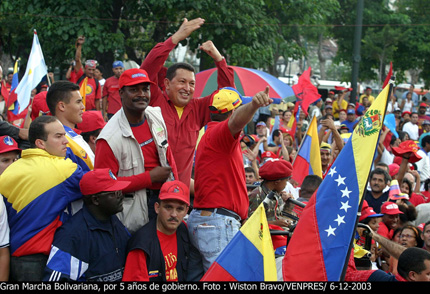
Today's Washington post has a very interesting article on Hugo Chavez's Venezuela. It's about the founding of community councils to partially replace elected mayors and municipal councils. It's not exactly clear how these councils are constituted, but the article states that for "big decisions" the elected councillors have to go back to community assemblies for a final decision.
I don't know quite to think about it. I haven't bought into the official American propaganda about how evil and threatening Chavez is, since it's entirely self-interested, but neither do I trust Chavez. The danger sign for me is that his preferred political methodologies seem to be ranting at the population for hours on end about every subject imaginable, and throwing government money around like there's no tomorrow. He reminds me all too much of Castro the Omniscent, not to mention every 20th century dictator you've heard of and all of those you haven't.
Also, the use of "community councils" can be a mere mask for dictatorship. Khaddafi abolished all the government institutions of Libya in favor of assemblies supposedly inspired by Berber customs, but guess who still controls everything, notably the energy revenues that constitute practically the entire economy the country?
Going back a couple of centuries, there are also the "section assemblies" of Paris during the Revolution that gave democracy such a bad name in Europe during the 19th century. "Section assemblies" were grassroots neighborhood groups that elected an electoral college which elected members of the National Assembly. After they chose the electoral college -- by voice vote -- the people were supposed to go home and let their betters run the government and guide the revolution. Well, a lot of them came back the next day, and the next, and the day after that and in the name of the people continually critiqued the elected government.
Sounds all very democratic, yes? Unfortunately, the sections in Paris became dominated by people convinced that they knew what the people wanted, and that everyone who opposed the people were evil "aristocrats." Continual voice votes in each section allowed the local aristocratic stooges (not necessarily nobles or even rich) to be identified and expelled. The sections, full of zealots, set up a communication network, armed themselves, and eventually seized control of the capital. This was a further step to dictatorship and government by Terror.
(The awful flavor of the word "terrorists" comes in part from the open use of terror -- revolutionary justice dispensed by kangaroo courts leading to execution -- by the resulting regime.)
So these community councils could go nowhere or worse. On the other hand, according to the WP article, there's a lot of enthusiasm on the popular level for this experiment, even among opponents of Chavez. Some people think that the old institutions of local government, which go back to colonial times, are worthless and the new councils may provide a way for them to solve some of their own problems. I direct you for some relevant thoughts about the vital role of local government in real democracies in Phil Paine's blog (under Sept. 25).
Good luck, Venezuela!
Image: Chavez surrounded by "the people"(?).
2 comments:
Do you know the english translation of "desarrollo endógeno"?. Unfortunatly like Celia Cruz used to say "my english is not very good looking". The thing is that democracy cannot be something developed by imposition and even without those considerations, all I can say is that I live here in Venezuela... those "community councils" might give to the people the feeling that the power its in their hands, but the truth is that the councils are managed directly by a central ministery so its the council, Chávez and nothing in the middle...quite an easy way to end up in authoritarism. No one should be surprised, when the results shows to be far away from that "democracy dream"
PS: Again, excuses for my poor english.
Your contribution is appreciated, Julia 1984.
Post a Comment